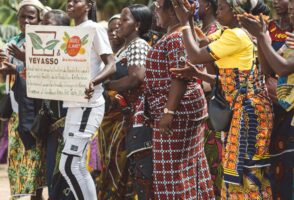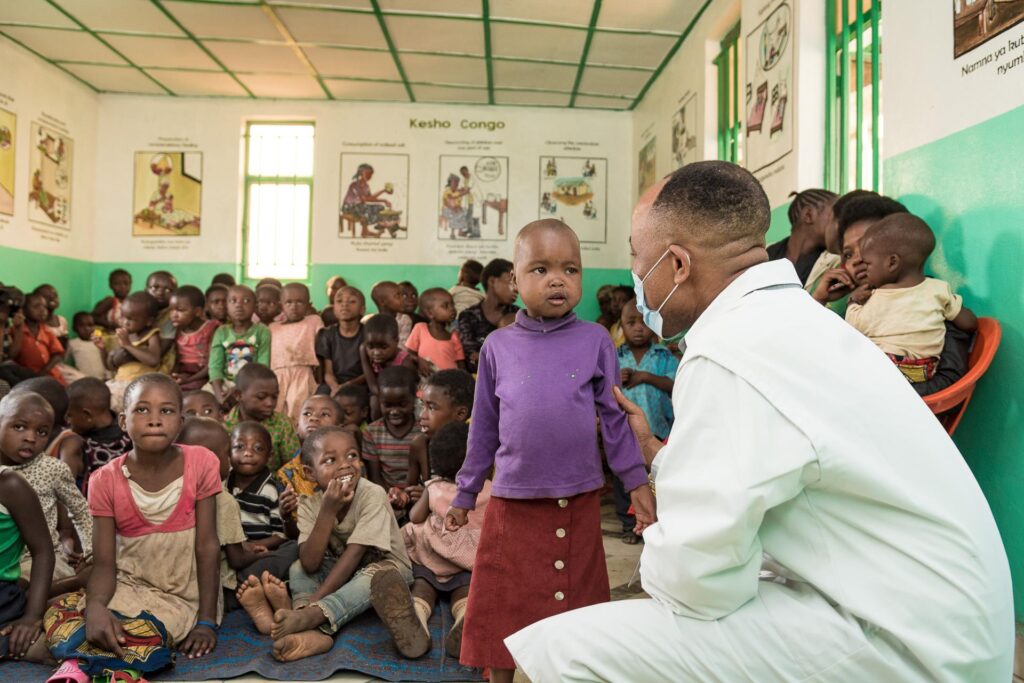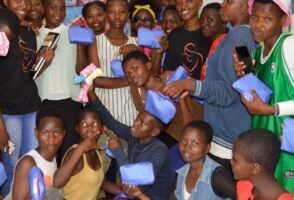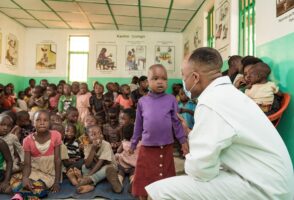
2024
“Yeyasso: the cooperative where all hopes are allowed”
The Yeyasso cocoa and coffee cooperative in the Ivory Coast makes every effort to stay one step ahead of major market trends
Read articleOne in two children in South Kivu is chronically malnourished. With KBF support, Kesho Congo is developing software to monitor patients in the eastern province more closely and using data research to find solutions to this complex problem.
For decades now the east of the Democratic Republic of Congo has been in the news for all the wrong reasons. Rebel armies are making the region unsafe. This has consequences on every level, not least for children. Official figures state that one in two are chronically malnourished, but that’s just “the tip of the iceberg; the real figures are even higher”, says paediatrician Adolphe Nyakasane. He leads the nutrition centre run by Kesho Congo, an NGO that works in the related areas of health and nutrition, education and agriculture.
“Violence has led to extreme suffering for the people living in the villages,” Nyakasane continues. Huge numbers of farmers are leaving their fields fallow and moving to the cities, where life is safer but much more expensive. Large families do not have enough money to provide enough food for everyone.
Other factors are also driving malnutrition in children: ignorance about healthy nutrition, mothers who are unable to care for their children due to the impact of domestic violence, or diseases such as gastrointestinal disorders.
With KBF support, Kesho Congo has developed a programme at its nutritional centre, where a team of nutrition experts, doctors and healthcare assistants organise weekly workshops. These focus on healthy eating, hygiene, vaccination and family planning, as well as identifying and treating chronically malnourished children.
All under-fives are weighed and their height, head circumference and arm circumference are measured. They are given a porridge of maize, sorghum and soya, enriched with a protein concentrate made from black-eyed peas, also known as cowpea. Children who need closer monitoring are given portions of the meal mix and concentrate to take home for the rest of the week.
The protein concentrate is manufactured in a Kesho Congo unit in Ruzizi. They supply it to 15 other nutrition centres and hospitals, including the Panzi hospital led by Doctor Denis Mukwege, Nobel Peace Prize laureate and winner of the 2011 KBF Africa Prize.
Doctor Nyakasane’s team has already gathered a lot of data about the children they are treating for malnutrition. “Paper-based records can easily get lost though. In any case, data doesn’t achieve anything by itself. It must be used to conduct research, arrive at a better understanding of the problem and come up with solutions.”
He therefore approached the KBF with a proposal to develop software to simplify follow-up for the children who are receiving treatment. “Secure storage of digital data for a longer period means that the information is more accessible for scientific research,” Nyakasane says.
“The data will help us to monitor the impact of our work and better understand the factors that cause malnutrition. We would also like to study the contribution of local solutions compared to imported solutions, and find out how paediatricians in hospitals and stakeholders in the community can act to avoid malnutrition relapse in children.”
Based on the answers to these research questions, proposals for improving children’s health and nutrition will be formulated for the National Nutrition Programme and health policymakers.
Kinshasa Digital Academy, a training centre in the Congolese capital supported by the Marie Antoinette Carlier Fund, had the technical expertise to create this software. Nyakasane says: “We wanted to be able to enter all the information about the children in our centre: their identity, weight and height, their arm and head circumference, vaccinations and other relevant information from the intake interview. We also asked for growth curves to be integrated in the system so that we can identify children with delayed growth and those who are underweight.”
Kinshasa Digital Academy immediately started work on the software and has continued to refine it since the initial delivery. “We also asked for this tool to be made accessible without an internet connection. Our partners in nutrition centres in remote villages don’t always have a reliable internet connection. Working offline means they can use the software all the time.”
Kesho Congo ultimately wants to see the software used throughout Congo. “We are starting with our own centres and then moving on to our partners in South Kivu. Based on our experiences, we can then improve the software before distributing it to the rest of the country.”

2024
The Yeyasso cocoa and coffee cooperative in the Ivory Coast makes every effort to stay one step ahead of major market trends
Read article
2023
A grant from BPF has dramatically boosted a young entrepreneur’s aim of radically improving the lives of girls and women in Rwanda by producing eco-friendly, reusable, and hygienic sanitary pads.
Read article
2023
One in two children in South Kivu is chronically malnourished. Kesho Congo is developing software to monitor patients more closely and using data research to find solutions to this complex problem.
Read articleTo stay informed about news from our partners and new calls for proposals
Subscribe to the newsletter